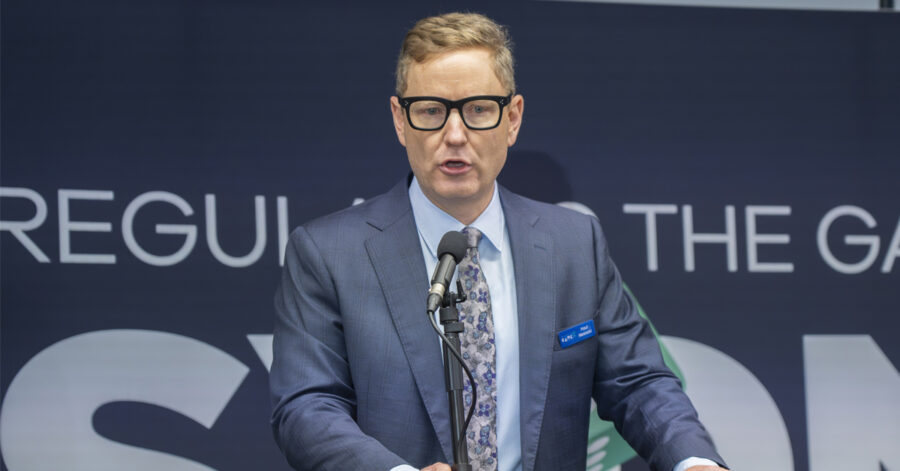Paul Newson: “NSW has lost its gambling policy and regulatory leadership mantle”

Paul Newson provides insights into the potential implications of the second Adam Bell SC inquiry into The Star and analysis of the wider industry landscape in Australia.
Exclusive interview.- To gain insight into the Australian gambling landscape and the potential implications of Adam Bell SC’s second inquiry into The Star Entertainment Group, Focus Gaming News spoke to Paul Newson, a principal at Vanguard Overwatch and the founder of the gambling law and regulation conference Regulating the Game held in Sydney and London.
Newson is a former deputy secretary of the NSW Department of Justice and then Industry responsible for emergency management and liquor, gambling & racing public policy and regulation in NSW. He is also a patron and former president of the International Association of Gaming Regulators and a former trustee of the NSW Responsible Gambling Fund.
What probability do you believe The Star has of retaining its casino licence in Sydney?
A bold wager or prescient forecast would be needed to predict the outcome of NSW gaming-related decision-making in the current climate. However, The Star’s engagement of Steve McCann, who successfully stewarded the fundamental repositioning of Crown under the comprehensive oversight of the Victorian Gambling and Casino Control Commission (VGCCC) monitoring arrangements, is a compelling appointment and telegraphs an authentic commitment to reclaim suitability.
How do you think the NICC’s decision will affect the gambling industry in Australia?
NSW has lost its gambling policy and regulatory leadership mantle. Its overreliance on successive inquiries and the combative engagement with The Star, ultimately ousting a highly accomplished chief executive, stands in unfortunate contrast to the successful rehabilitation of Crown. Despite these concerns, the decision about The Star’s suitability and its licence is significant, and cancellation would cause unwanted upheaval and on one view reflect a dim view about the efficacy of the regulator.
While casinos are major entertainment hubs and make substantial contributions to the economy, they represent only one part of the sector. Arguably a more pressing and material issue for the wider sector, particularly as AUSTRAC pivots from investigating corporate bookmakers to pubs and clubs, is ensuring anti-money laundering (AML) arrangements are robust.
Pubs and clubs must be alert to the immediacy of this task and are directing appropriate resources and capabilities toward addressing money laundering risks. Ensuring robust risk management and effective AML compliance should be a top priority for senior management and boards.
Additionally, responsible gambling reforms require increased attention and investment. The days of a passive approach to responsible gambling are numbered. While the regulatory framework may not be as stringent as the AML regime, promoting safer gambling is fundamental to the industry’s sustainability and demonstrates industry leadership and provides a foundation for a persuasive voice in policy matters.
“The decision about The Star’s suitability and its licence is significant, and cancellation would cause unwanted upheaval and on one view reflect a dim view about the efficacy of the regulator.”
Crown Resorts went through a similar process and the company was eventually sold, do you think something similar could happen with The Star Entertainment Group?
Steve McCann’s commencement is a strong signal that The Star is less interested in a rapid sale and is committed to achieving suitability, despite difficulties with the regulator. Once the benefits of these reforms are recognised by the market and regulatory pressure has possibly normalised, more interested parties may consider an acquisition.
However, the Australian regulatory environment is increasingly challenging for casino operators. The gaming business faces significant headwinds with sizeable costs accruing to remediation efforts and building financial crime capabilities comparable to major banks. A key concern is the sustainability of such demands and whether an uncommercial lens and hostile regulatory environment can persist.
The country’s major casinos such as The Star, SkyCity and Crown Resorts have been through several inquiries in recent years. Does this reveal a failure in the regulatory environment or the opposite?
Regrettably, the Minns government inherited a complex and problematic gambling regulatory environment from the previous administration, which left a regulatory capability and leadership vacuum. The muddled handling of regulatory reform, coupled with ineffective supervision of The Star and its remediation efforts, highlights significant shortcomings.
The necessity for yet another regulator-appointed inquiry, underlined by the stark contrast in approaches between the comprehensive Victorian model, which facilitated the conditions for Crown’s rehabilitation and reclaiming of suitability, and the seemingly underweight and opaque NSW approach to monitoring The Star, perhaps cements these concerns.
Given the extraordinary nature of these monitoring arrangements, where the regulator appoints a manager to assume full control and responsibility for the casino business, and the subsequent recourse to another regulator-appointed inquiry, it seems there is a shortage of inquiring minds and informed questions being asked about how NSW fumbled its hand so convincingly.
Chris Minns’ government has been working on reforms such as cashless gambling, the introduction of a responsible gambling officer in some pubs and clubs, limits on ads, etc. How do you see these measures?
The industry had been advocating for cashless as part of a payment mix since around 2017 when Liquor & Gaming NSW established a regulatory sandbox to examine proposals including digital wallets in detail. The initiative was abandoned following the former government’s ill-fated decision to roll the regulator into its Customer Service department in 2019.
The call for mandatory cashless gaming surfaced during the frenetic 2023 election environment, promoted as a tool to curb alleged widespread money laundering in pubs and clubs. While the extent of money laundering may have been less sensational than portrayed, the cashless initiative has merit and reflects a broader trend in the community. However, consumers also desire choice and the option to use cash for gaming or purchases.
The Responsible Gambling Officer (RGO) role is an important initiative that enhances the capability of pubs and clubs to foster safer gambling environments and better monitor player behaviour and well-being. On balance, the effectiveness of RGOs in promoting responsible gambling outcomes will largely turn on the leadership and culture of the venues.
“On balance, the effectiveness of RGOs in promoting responsible gambling outcomes will largely turn on the leadership and culture of the venues.”
What are your thoughts on the current outlook for the gambling industry in Australia?
Gambling remains a contentious and predominantly state-led policy domain, lacking the cohesive industry representation and advocacy seen in financial services and banking. The financial sector adeptly rehabilitated itself following the damning findings of the Royal Commission into Misconduct in the Banking, Superannuation, and Financial Services Industry.
Unsurprisingly, given the rare application of invasive monitoring arrangements on a global scale and banking’s pivotal role within the economy’s infrastructure, no independent monitors were appointed as a result of the Banking Royal Commission. This contrast underscores the distinct challenges and regulatory scrutiny faced by the gambling industry, which has yet to achieve the same level of systemic reform and public trust restoration.
Looking across the ditch, the recent announcement by the New Zealand Government to establish a licensing regime for online casinos by 2026 marks a significant shift in its approach and a welcome recognition that licensing is a superior policy compared to the pyrrhic lever of prohibition. This change aims to prevent revenue leakage and improve player protection.
In contrast, Australia suffers from its own policy myopia in this area, and the issue likely lacks the perceived importance or political interest needed for timely resolution.









